★★½
“Because Lady Moderate Breeze wouldn’t sell as many copies.”
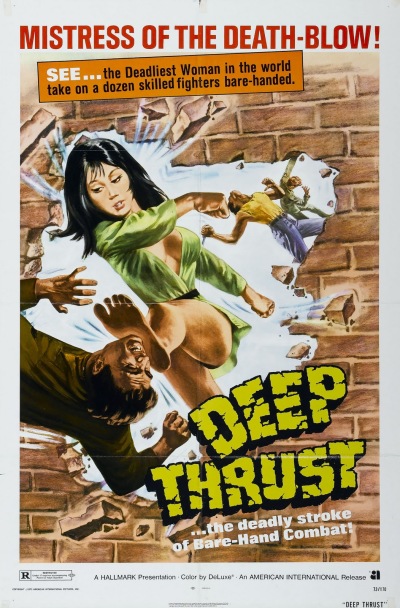 I’m not saying this is a bad film. But when I watch one called Lady Whirlwind (though here is as good a place as any to acknowledge the wonderfully tacky alternate title featured on the poster at the right), I expect a good deal more lady whirlwinding. The focus is instead on Ling Shi-Hao (Chang), beaten and left for dead after trying to leave a gang. Wisely, he decides to continue with his death, hiding out in the country for three years with girlfriend Hsuang Hsuang (We). This anonymity is shattered by the arrival of Tien Li-Chun (Mao), who wants a word with Ling, along with ripping the beating heart out of his chest. For it turns out, he was a bit of a bastard who jilted Tien’s sister, leading to her suicide. Hence, when he thanks Tien for saving him, she replies, “I just didn’t want somebody else to kill you.”
I’m not saying this is a bad film. But when I watch one called Lady Whirlwind (though here is as good a place as any to acknowledge the wonderfully tacky alternate title featured on the poster at the right), I expect a good deal more lady whirlwinding. The focus is instead on Ling Shi-Hao (Chang), beaten and left for dead after trying to leave a gang. Wisely, he decides to continue with his death, hiding out in the country for three years with girlfriend Hsuang Hsuang (We). This anonymity is shattered by the arrival of Tien Li-Chun (Mao), who wants a word with Ling, along with ripping the beating heart out of his chest. For it turns out, he was a bit of a bastard who jilted Tien’s sister, leading to her suicide. Hence, when he thanks Tien for saving him, she replies, “I just didn’t want somebody else to kill you.”
Ling admits he deserves his fate, but asks for a stay of execution, so he can first take revenge on his former colleagues (who include Sammo Hung in an early role). Tien is clearly pretty laid-back about the whole vengeance thing, since she’s nowhere to be seen during the lengthy training montage that follows, after Ling helps a Korean herbalist, bitten by a snake, and is taught the deadly Tai Chi Palm style. Will that help him beat the bad guys? And will Tien then stop lurking off-screen and goddamn do something?
There’s certainly no shortage of action, though in comparison to some other Mao films I’ve seen recently, the fight scenes doesn’t seem as smoothly choreographed and frankly, get a bit boring – it also suffers too much from the “we’ll attack you one at a time, while everyone else circles about aimlessly” trope, common to many movies of the time. Indeed, I must admit, there was one of Ling’s battles in the middle where I actually fell asleep: never a good sign where a martial-arts films is concerned. The frequent use of musical cues definitely not composed for the film is also rather distracting: one, in particular, will be particularly familiar if you’ve watched James Bond movies, but other sources say the pillaging also includes the works of Ennio Morricone and Bernard Herrmann. Hey, if you’re going to steal, do it from the best, I suppose.
Mao does have some good fight scenes, particularly going one-on-many with a copious line of henchmen. But you wonder why she’s so apparently disinterested in her revenge, particularly at the end, which is entirely ludicrous, and all but negates everything that happened over the previous 80 minutes. Not one of her best, with not enough going on beyond her usual graceful performance, to merit your attention.
Dir: Huang Feng
Star: Chang Yi, Angela Mao, Pai Ying, June Wu
a.k.a. Deep Thrust







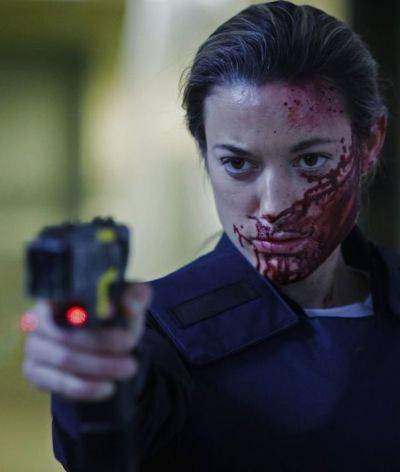
 The main mission given to Rie (Shiratori this time) is a little bit different, from her usual, straight-forward assassinations. Instead, she’s given the job of protecting a witness. Nana (Matsuda), the disgruntled mistress of an organ-trafficking ring, who has had enough and agreed to co-operate with the police. Rie is part of the protection detail, but soon finds out that the gangsters, under ever-so strange boss Kaneda (Nogami) with his transvestite tendencies, are not going to sit back and wait for Nana to take the witness stand. Oddly, the cops let Nana stay in her own apartment, perhaps figuring that’s the last place her former lover would look. but when that is unsurprisingly stormed, Rie takes the target back to the operative’s flat, where they hang out, exchanging small talk – that’s mostly Nana, of course, since Rie is about as talkative as the enormous pet fish she has in a tank, and to which she feeds goldfish.
The main mission given to Rie (Shiratori this time) is a little bit different, from her usual, straight-forward assassinations. Instead, she’s given the job of protecting a witness. Nana (Matsuda), the disgruntled mistress of an organ-trafficking ring, who has had enough and agreed to co-operate with the police. Rie is part of the protection detail, but soon finds out that the gangsters, under ever-so strange boss Kaneda (Nogami) with his transvestite tendencies, are not going to sit back and wait for Nana to take the witness stand. Oddly, the cops let Nana stay in her own apartment, perhaps figuring that’s the last place her former lover would look. but when that is unsurprisingly stormed, Rie takes the target back to the operative’s flat, where they hang out, exchanging small talk – that’s mostly Nana, of course, since Rie is about as talkative as the enormous pet fish she has in a tank, and to which she feeds goldfish. I first encountered this in a dreadful copy on Youtube: dubbed, cropped to 4:3 and apparently filmed off someone’s TV during a Force 10 storm at sea. However, what was left after that, was still impressive enough to make me track down a better copy. Well, somewhat better: it had subs, albeit burned in and incomplete, while the 16:9 ratio was at least a vague approximation to the original widescreen print. Still, you take what you get, and this is certainly enough fun to overcome the adversity of any flaws in the format.
I first encountered this in a dreadful copy on Youtube: dubbed, cropped to 4:3 and apparently filmed off someone’s TV during a Force 10 storm at sea. However, what was left after that, was still impressive enough to make me track down a better copy. Well, somewhat better: it had subs, albeit burned in and incomplete, while the 16:9 ratio was at least a vague approximation to the original widescreen print. Still, you take what you get, and this is certainly enough fun to overcome the adversity of any flaws in the format.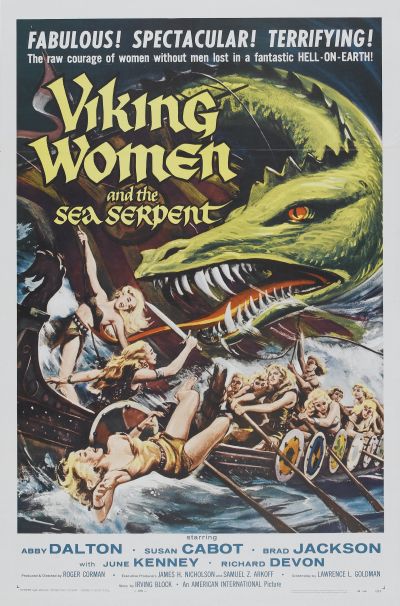 I can see why, purely for reason of brevity, the title above was preferred to the full one of The Saga of the Viking Women and Their Voyage to the Waters of the Great Sea Serpent, even though the latter is more accurate. For the Sea Serpent has a supporting role here, met once on their way in, and again on the way out – it’s much more about what happens in the middle. Three years after their men left, the women of the Stannjold clan leave their shores under the command of Desir (Dalton), trying to find out what happened to them. Encounter #1 with the monster leads them to be shipwrecked on the same shores of the Grimault tribe as their menfolk, whose king, Stark (Devon), has set them to work as slaves in his mines. After initially appearing to welcome the women, it becomes clear that Stark has plans for the new arrivals as well. Viking high-priestess Enger (Cabot) has her own agenda, however: having set her eyes both on Desir’s husband and, for more immediate and pragmatic reasons, Stark, she sabotages Desir’s first attempt to free the men.
I can see why, purely for reason of brevity, the title above was preferred to the full one of The Saga of the Viking Women and Their Voyage to the Waters of the Great Sea Serpent, even though the latter is more accurate. For the Sea Serpent has a supporting role here, met once on their way in, and again on the way out – it’s much more about what happens in the middle. Three years after their men left, the women of the Stannjold clan leave their shores under the command of Desir (Dalton), trying to find out what happened to them. Encounter #1 with the monster leads them to be shipwrecked on the same shores of the Grimault tribe as their menfolk, whose king, Stark (Devon), has set them to work as slaves in his mines. After initially appearing to welcome the women, it becomes clear that Stark has plans for the new arrivals as well. Viking high-priestess Enger (Cabot) has her own agenda, however: having set her eyes both on Desir’s husband and, for more immediate and pragmatic reasons, Stark, she sabotages Desir’s first attempt to free the men. Star Jill Kelly is an adult actress. I mention this, because it seems highly likely that most of her 300+ other works – perhaps The Butt Sisters Do Philadelphia or Sodomania: Slop Shots 5 – are likely better scripted, filmed, edited and generally well-made than this dreadful piece of crap. I should have known, given Donald G. Jackson’s involvement – he’s probably the worst film-maker I’ve ever had the misfortune to encounter, and I speak as someone fully familiar with the works of Ed Wood, Andy Milligan, J.P. Simon and Uwe Boll. They are all pretenders beside Jackson, and even though this barely runs an hour, your patience will be sorely tried. And by “tried”, I mean at the level where gnawing a limb off to escape will seems credible.
Star Jill Kelly is an adult actress. I mention this, because it seems highly likely that most of her 300+ other works – perhaps The Butt Sisters Do Philadelphia or Sodomania: Slop Shots 5 – are likely better scripted, filmed, edited and generally well-made than this dreadful piece of crap. I should have known, given Donald G. Jackson’s involvement – he’s probably the worst film-maker I’ve ever had the misfortune to encounter, and I speak as someone fully familiar with the works of Ed Wood, Andy Milligan, J.P. Simon and Uwe Boll. They are all pretenders beside Jackson, and even though this barely runs an hour, your patience will be sorely tried. And by “tried”, I mean at the level where gnawing a limb off to escape will seems credible.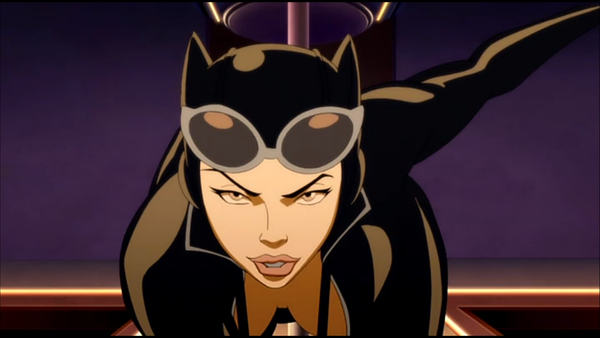 The character of Catwoman has had a mixed history over the years in other media than the printed page. TV has had the Julie Newmar & Eartha Kitt versions, a nod in Birds of Prey, and a teenage version of the character can be seen in the Gotham series which premiered last month. In film, we had Lee Meriwether in the sixties incarnation then, perhaps most famously of all, Michelle Pfeiffer in Batman Returns [albeit only after Annette Bening, Nicole Kidman and Demi Moore all were linked to the part]. Then, there was Halle Berry’s Catwoman, still talked about in hushed tones as perhaps the worst comic-book adaptation of all time, and which arguably did more damage to action heroines than any other big-budget movie in history. Despite the massive success of the Batman reboot, it took eight years before the character would appear in another film, Anne Hathaway playing Selina Kyle in The Dark Knight Rises.
The character of Catwoman has had a mixed history over the years in other media than the printed page. TV has had the Julie Newmar & Eartha Kitt versions, a nod in Birds of Prey, and a teenage version of the character can be seen in the Gotham series which premiered last month. In film, we had Lee Meriwether in the sixties incarnation then, perhaps most famously of all, Michelle Pfeiffer in Batman Returns [albeit only after Annette Bening, Nicole Kidman and Demi Moore all were linked to the part]. Then, there was Halle Berry’s Catwoman, still talked about in hushed tones as perhaps the worst comic-book adaptation of all time, and which arguably did more damage to action heroines than any other big-budget movie in history. Despite the massive success of the Batman reboot, it took eight years before the character would appear in another film, Anne Hathaway playing Selina Kyle in The Dark Knight Rises.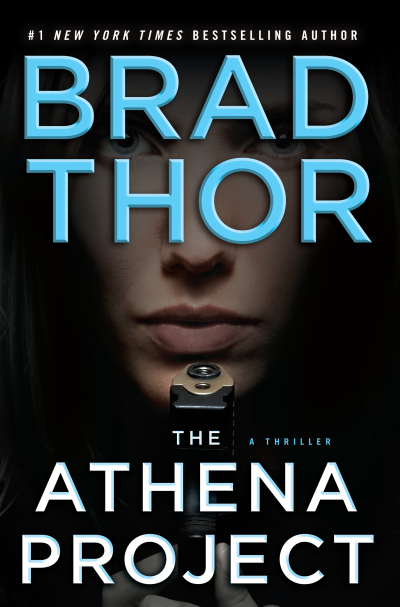 I first became aware of this novel through an article back in February about MMA champion Ronda Rousey and
I first became aware of this novel through an article back in February about MMA champion Ronda Rousey and 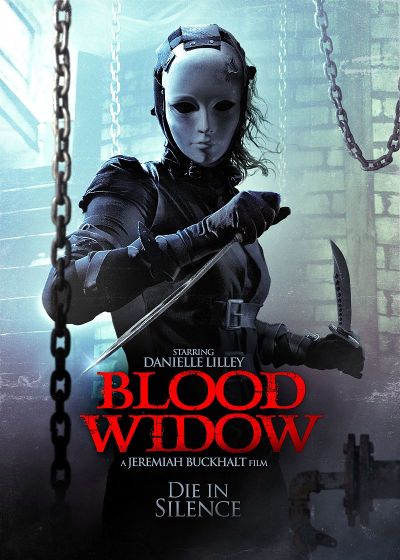 In the slasher genre of horror, the perpetrators seem almost exclusively male: Michael Myers, Jason Vorhees, Freddy Krueger, etc. Women can play an important role, and we’ve covered some of them here before – but it’s much more often as the “final girl”, than the one wielding the machete. However, it’s often forgotten that, in the original Friday the 13th movie, the killer was not Jason, but his mother, so there is some precedent for the female antagonist. See also Nurse 3D, American Horror Story: Coven or perhaps best of all,
In the slasher genre of horror, the perpetrators seem almost exclusively male: Michael Myers, Jason Vorhees, Freddy Krueger, etc. Women can play an important role, and we’ve covered some of them here before – but it’s much more often as the “final girl”, than the one wielding the machete. However, it’s often forgotten that, in the original Friday the 13th movie, the killer was not Jason, but his mother, so there is some precedent for the female antagonist. See also Nurse 3D, American Horror Story: Coven or perhaps best of all,